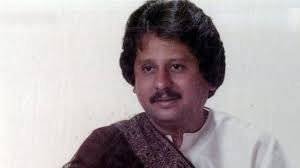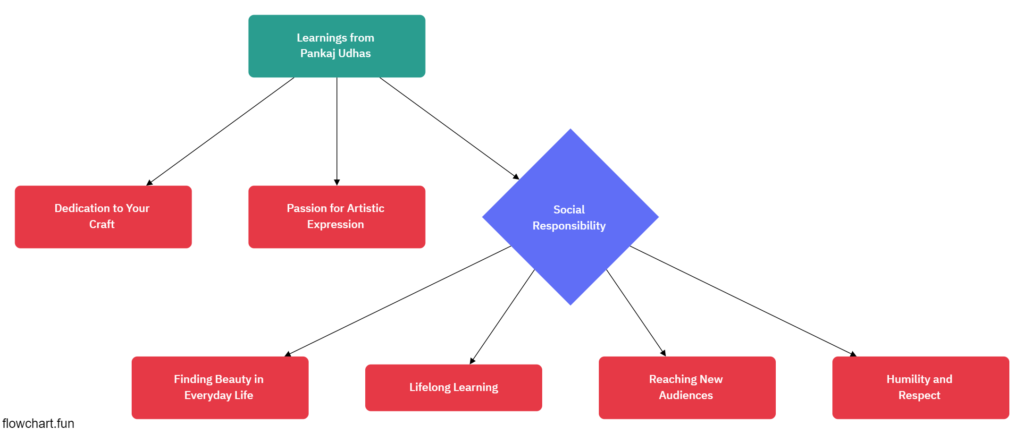
7 things to learn from this great personality

Learnings from Pankaj Udhas:
| Learning | Description |
|---|---|
| Dedication to Your Craft | Udhas’ lifelong devotion to ghazals showcases the power of dedication. |
| Passion for Artistic Expression | Udhas’ love for Urdu poetry and his desire to share it through music highlight the importance of pursuing artistic expression. |
| Reaching New Audiences | Udhas understood the importance of keeping ghazals relevant. By collaborating with contemporary poets and experimenting with arrangements, he made the genre accessible to younger generations. |
| Humility and Respect | Despite his fame, Udhas remained grounded and respectful. He valued his fans, fellow musicians, and his family, inspiring us to maintain humility even in success. |
| Social Responsibility | Udhas used his platform to raise awareness about social issues and supported charitable causes. We can learn to use our talents and influence to make a positive impact on the world. |
| Lifelong Learning | Udhas’ constant exploration of poetry and music highlights the importance of lifelong learning. He never stopped seeking new ways to express himself and connect with his audience. |
| Finding Beauty in Everyday Life | Ghazals often explore themes of love, longing, and human emotions. Udhas’ music reminds us to find beauty and meaning in the everyday experiences of life. |
Early Life
- Born: May 17, 1951, Jetpur, Gujarat, India
- Parents: Keshubhai Udhas (father) and Jituben Udhas (mother)
- Siblings: Manhar Udhas (elder brother, singer) and Nirmal Udhas (elder brother, singer)
- Family Background: Zamindars (traditional landlords)
Musical Journey
- Early Training:
- Tabla lessons at Sangeet Natya Academy, Rajkot
- Hindustani classical vocal music under Ghulam Qadir Khan Sahab
- Training under Navrang Nagpurkar, a singer from the Gwalior Gharana
- Ghazals:
- Developed an interest in ghazals and learned Urdu to pursue a career
- First ghazal album, “Aahat,” released in 1980
- Released over 50 albums and hundreds of compilation albums throughout his career
- Playback Singing:
- Sang for several Bollywood films, including “Naam” (1986), where his song “Chitthi Aayi Hai” brought him fame
- Notable duets include “Mahiya Teri Kasam” with Lata Mangeshkar (Ghayal, 1990) and “Na Kajre Ki Dhar” with Sadhana Sargam (Mohra, 1994)
Legacy
- Awards:
- Padma Shri (2006) – India’s fourth-highest civilian award
- Numerous other awards recognizing his contribution to ghazals and music (see table below)
- Achievements:
- Promoted Urdu language through ghazal singing
- Brought ghazals to a wider audience with global performances
- Launched a talent hunt show “Aadab Aarz Hai” to nurture upcoming ghazal singers
Table: Awards and Recognition
| Award | Year | Description |
|---|---|---|
| Padma Shri | 2006 | India’s fourth-highest civilian award |
| “Kalakar” award | 2005 | Best Ghazal Album for “Hasrat” |
| MTV Immies Award | 2003 | Successful album “In Search of Meer” |
| Special Achievement Award | 2003 | Bollywood Music Award for Popularizing Ghazals Across the Globe |
| Dadabhai Naoroji Millennium Award | 2003 | Contribution to Ghazal and the Music Industry |
| (Several other awards throughout his career) |
Pankaj Udhas: A Legacy Beyond Music
Beyond the Stage
- Pankaj Udhas was known for his humble and down-to-earth personality.
- He actively participated in social causes and charity events.
- He was a devoted family man and cherished his relationships with his wife, Deepti Udhas, and their two sons.
Impact on Ghazal Genre
- Udhas’ expressive voice and soulful renditions of ghazals brought a new dimension to the genre.
- He collaborated with renowned Urdu poets like Mirza Ghalib, Jan Nisar Akhtar, and Faiz Ahmed Faiz.
- He also experimented with contemporary ghazal compositions, appealing to a younger audience.
- His success paved the way for other ghazal singers and helped keep the genre alive for future generations.
Remembering the Legend Pankaj Udhas: The Melodious Voice of Ghazals
- Pankaj Udhas passed away on February 26, 2024, leaving a void in the Indian music scene.
- His legacy continues to inspire aspiring singers and music lovers worldwide.
- Tributes continue to pour in from fans, fellow musicians, and celebrities, acknowledging his immense contribution to the world of ghazals.
Exploring Further
- You can find a vast collection of Pankaj Udhas’ ghazals on various music streaming platforms.
- You can also watch his live performances and interviews on YouTube: URL youtube ON youtube.com.
- Several documentaries and biographies delve deeper into his life and musical journey.
Delving Deeper into Pankaj Udhas’ Ghazals
While Pankaj Udhas’ vast discography offers a treasure trove of ghazals, here are some insights to guide your exploration:
Thematic Exploration:
- Love and Longing: Many of Udhas’ ghazals explore the complexities of love, from passionate yearning to the bittersweet pangs of separation. Albums like “Aafreen” and “Nayaab” showcase these themes beautifully.
- Social Commentary: Udhas tackled social issues like societal expectations and the struggles of everyday life. “Hasrat” and “Mehfil” contain ghazals that delve into these topics.
- Spiritual Musings: Udhas also explored themes of faith and finding solace in a higher power. Albums like “Kaif” and “Khayal” feature ghazals with a spiritual touch.
Exploring Collaborations:
- Udhas and the Masters: Udhas’ renditions of ghazals by legendary poets like Mirza Ghalib and Faiz Ahmed Faiz are considered masterpieces. Albums like “Rubayee” and “In Search of Meer” are great starting points.
- Contemporary Collaborations: Udhas also collaborated with contemporary Urdu poets, keeping the ghazal form relevant. Albums like “Mahek” and “Ghoonghat” feature such collaborations.
Live Performances:
- Udhas’ live performances captured the raw emotions of his ghazals. Albums like “Pankaj Udhas Live at Royal Albert Hall” and “The Legend Forever” offer a glimpse into his captivating stage presence.
Exploring Beyond Albums:
- Duets: Udhas’ duets with female singers like Lata Mangeshkar and Sadhana Sargam are a unique listening experience. Explore compilations featuring these collaborations.
- Tribute Albums: Since his passing, several tribute albums by other artists have been released. These offer new interpretations of his ghazals.
Finding the Right Ghazals:
With such a vast collection, finding the perfect ghazal depends on your mood.
- Feeling romantic? Explore “Aashiyan” or “Ek Dhun Pyar Ki”.
- Looking for social commentary? Try “Hasrat” or “Muskaan”.
- Seeking spiritual solace? Listen to “Kaif” or “Khayal”.
Remember, this is just a starting point. Pankaj Udhas’ ghazals offer a lifetime of exploration. Enjoy the journey!
Pankaj Udhas: The Man Behind the Music
While we’ve explored Pankaj Udhas’ musical legacy, here’s a glimpse into the man himself:
Early Influences:
- Family: Udhas’ family had a rich musical heritage. His father and brothers were also singers, fostering a love for music from a young age.
- Ghazal Legends: Udhas deeply admired ghazal maestros like Jagjit Singh and Mehdi Hassan. Their styles had a significant influence on his own singing.
- Urdu Poetry: Udhas’ passion for Urdu poetry fueled his desire to become a ghazal singer. He spent considerable time understanding the nuances of the language and its emotional depth.
Personality and Values:
- Humility: Despite his fame, Udhas remained grounded and connected to his roots. He was known for his gentle demeanor and respect for his fans and fellow artists.
- Social Responsibility: Udhas believed in using music for social good. He actively participated in charity events and raised his voice for causes he believed in.
- Family Man: Family was a cornerstone of Udhas’ life. He found immense support and inspiration in his wife and sons.
Beyond Music:
- Philanthropy: Udhas supported various charitable organizations and causes throughout his career.
- Mentorship: He actively mentored aspiring singers and helped promote upcoming ghazal artists.
- Poetry and Writing: Udhas had a keen interest in writing. He penned some ghazals himself and even wrote poetry outside of music.
A Legacy of Inspiration
Pankaj Udhas wasn’t just a singer; he was a passionate artist who breathed life into Urdu poetry. His dedication to ghazals not only revived the genre but also introduced it to a wider audience. His humility, social conscience, and unwavering love for music continue to inspire generations of musicians and music lovers worldwide.

